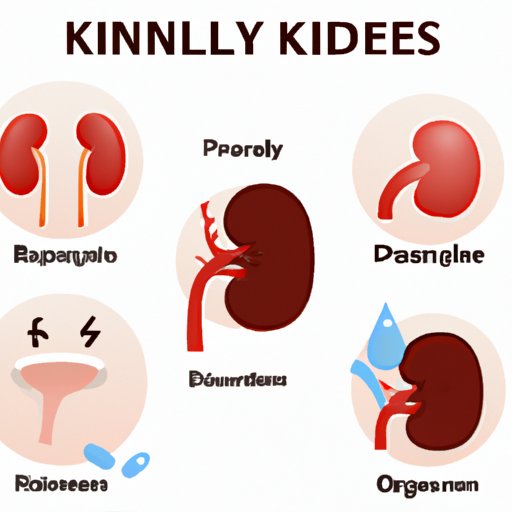
Introduction
Kidneys are essential organs that play a crucial role in removing waste, excess fluids, and toxins from the body. These bean-shaped organs also help regulate blood pressure and produce hormones that support healthy bone growth and red blood cell production. However, many people may not realize they have kidney problems until the condition has advanced, making it challenging to manage and treat effectively. In this article, we discuss the importance of recognizing the early signs of kidney problems and provide a comprehensive guide to help you understand the symptoms and how to manage them.
10 Warning Signs of Kidney Problems: How to Spot Them Early
Some of the early signs of kidney problems include frequent urination, fatigue, swelling in the hands and feet, and changes in urination patterns. Other symptoms may include nausea, vomiting, back pain, and foul-smelling urine. If you’re at risk for kidney problems, including anyone with a family history of kidney disease, high blood pressure, or diabetes, it’s important to monitor your kidney health and recognize any changes in your body. If you experience any of these symptoms, seek medical attention promptly.
Understanding Kidney Issues: Symptoms and How to Manage Them
There are several common kidney issues, including urinary tract infections (UTIs), kidney stones, and cysts. Symptoms of these conditions can include pain in the lower back or sides, blood in the urine, and difficulty urinating. To manage these conditions, your doctor may recommend dietary changes, medication, or surgery. It’s important to seek treatment early to prevent the condition from worsening.
Kidney Disease in America: Top 5 Symptoms to Watch Out For
Kidney disease is a prevalent condition in the United States, affecting an estimated 37 million people. The top symptoms to be aware of include high blood pressure, anemia, low urine output, fluid retention, and fatigue. These symptoms can be managed with medication, dialysis, or transplantation. Understanding the risk factors and symptoms of kidney disease can help individuals take action to protect their kidney health.
All You Need to Know About Kidney Failure: Causes and Signs
Kidney failure occurs when the kidneys cannot remove waste and excess fluids from the body effectively. Common causes of kidney failure include diabetes, high blood pressure, and inflammation of the kidneys. Symptoms of kidney failure include loss of appetite, difficulty sleeping, and confusion. Treatment options may include dialysis, transplantation, or medication.
Healthy Kidneys, Healthy Life: A Guide to Recognizing Symptoms of Kidney Disease
Recognizing the symptoms of kidney problems early is crucial to maintaining healthy kidneys and preventing severe complications. Some key signs to watch for include changes in urination patterns, swelling in the hands and feet, and persistent fatigue. You can also protect your kidney health by eating a healthy diet, maintaining a healthy weight, and avoiding smoking and excessive alcohol intake. If you suspect you have a kidney problem, speak with your doctor to obtain a proper diagnosis and treatment plan.
Conclusion
Kidney problems can be challenging to manage, but recognizing the early signs can significantly improve treatment outcomes. By maintaining a healthy lifestyle and monitoring your kidney health, you can take proactive steps to protect your kidneys. If you experience any symptoms of kidney problems, seek medical attention promptly. Take care of your kidney health, and your kidneys will take care of you.




